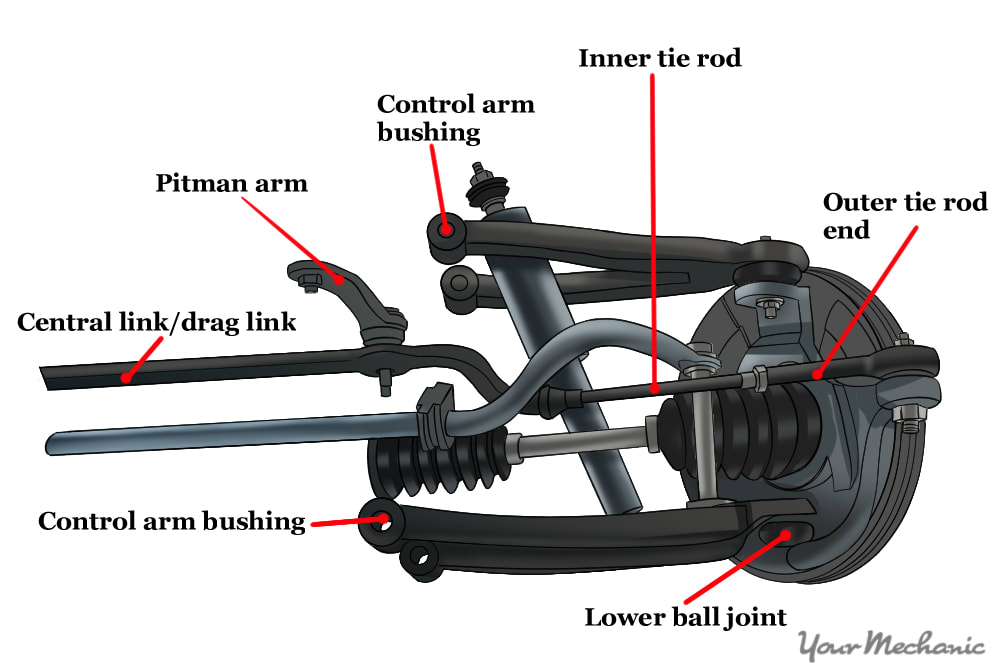Have you ever felt a strange vibration in your steering wheel while driving? It can be unsettling, making you wonder if something is wrong with your car.
Understanding what causes steering wheel vibration is crucial not only for your peace of mind but also for your safety on the road. By pinpointing the cause, you can address the issue before it leads to more significant problems. Imagine cruising smoothly down the highway, confident in your vehicle’s performance.
That’s the experience you deserve. We’ll explore the common culprits behind steering wheel vibration, like bad struts and other potential issues. We’ll explain what it means when your steering wheel vibrates and offer insights to help you keep your car running smoothly. Stay with us as we uncover the secrets to a smoother, safer drive, ensuring that your journeys remain as comfortable and enjoyable as possible.

Credit: www.yourmechanic.com
Can Bad Struts Cause Steering Wheel Vibration
Steering wheel vibration can be caused by bad struts affecting the vehicle’s suspension system. Damaged struts fail to absorb road impacts properly, leading to noticeable vibrations. Regular maintenance helps identify and fix these issues, ensuring smoother driving.
A bumpy ride can be both uncomfortable and worrisome. One common issue many drivers face is a vibrating steering wheel. This problem can stem from various sources, but one question often arises: can bad struts be the culprit? Let’s explore this intriguing possibility.
Understanding Struts
Struts play a vital role in your car’s suspension system. They help absorb shocks from the road and ensure a smooth ride. But what happens when they fail?
- Wear and Tear: Over time, struts can wear out, leading to reduced performance.
- Shock Absorption: Damaged struts fail to absorb shocks, affecting the ride quality.
- Vehicle Stability: Bad struts can compromise the stability of your car, especially during turns.
Impact Of Bad Struts On Steering Wheel
Struts may indirectly cause steering vibrations. Here’s how:
- Alignment Issues: Faulty struts can affect wheel alignment, leading to vibrations.
- Uneven Tire Wear: Bad struts may cause uneven tire wear, which can result in a shaky steering wheel.
- Loose Components: Worn struts might cause other suspension parts to become loose, contributing to vibrations.
Signs Of Bad Struts
Recognizing the signs of bad struts early can prevent further issues.
- Bouncing Ride: If your car bounces excessively, struts may be the issue.
- Nose Diving: During braking, a nose dive could indicate strut problems.
- Tire Cupping: Uneven tire wear patterns, known as cupping, often point to strut trouble.
Steps To Address Strut Issues
Addressing strut problems can restore your car’s smooth ride. Consider these steps:
- Inspection: Have a professional inspect your suspension system for damage.
- Replacement: If struts are bad, replacing them is crucial for safety.
- Regular Maintenance: Routine checks can help spot potential issues early.
By understanding and addressing strut-related issues, you can maintain a smooth and safe driving experience.
What Does It Mean When The Steering Wheel Vibrates
Steering wheel vibration often signals issues with the vehicle’s balance or alignment. Common causes include unbalanced tires, warped brake rotors, or worn suspension components. Addressing these problems promptly ensures a smoother and safer driving experience.
Feeling a strange tremor in your steering wheel? It can be unsettling. This common issue might signal various underlying problems. Understanding the root cause is crucial. Let’s explore what it means when the steering wheel vibrates.
Unbalanced Tires
Sometimes, the simple things cause the biggest issues. Tire imbalance is a frequent culprit.
- Tire imbalance: Uneven weight distribution can cause vibrations at certain speeds.
- Worn tires: Tread wear can lead to uneven contact with the road.
- Improper tire alignment: Misaligned tires can create friction and vibrations.
Brake System Issues
Braking should be smooth. If it’s not, vibrations could be a sign.
- Warped brake rotors: Heat can warp rotors, leading to uneven braking.
- Faulty brake calipers: Sticking calipers can cause jerking sensations.
- Worn brake pads: Uneven pad wear might lead to pulsating brakes.
Suspension Problems
The suspension system keeps your ride smooth. Problems here can be felt in the steering wheel.
Suspension issues often lead to steering wheel vibrations. Components wear out over time. Bushings, tie rods, or shock absorbers might be the problem. Regular checks can prevent bigger issues.
Engine Troubles
Engine problems can also lead to vibrations. These are often less obvious but equally important.
- Misfiring engine: Irregular firing can cause shaking.
- Loose engine mounts: They dampen engine vibrations; if loose, shaking occurs.
- Faulty spark plugs: Poor spark plugs can disrupt engine function.
Understanding these potential causes can guide you to a smoother drive. Regular maintenance helps prevent many of these issues. Keep your vehicle in top shape and enjoy the journey.

Credit: www.youtube.com
Conclusion
Steering wheel vibrations signal potential vehicle issues. Bad struts can shake the wheel. It affects control and comfort. Vibration means something isn’t right. Maybe the tires need balancing. Or the brakes have problems. Ignoring these signs can lead to bigger repairs.
A smooth drive keeps you safe. Regular maintenance helps prevent vibrations. Check with a professional. They can diagnose and fix the cause. Keep your steering steady and your driving experience enjoyable. Addressing vibrations early saves time and money. Always prioritize safety on the road.
